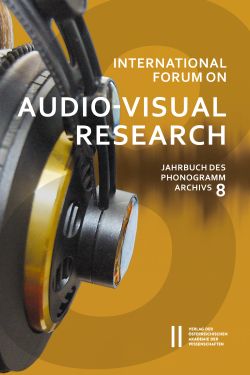 |
 |
Helmut Kowar (Hg.)
International Forum on Audio-Visual Resarch
Jahrbuch des Phonogrammarchivs 8
Lorenz Nigst
S. 56 - 81 doi: 10.1553/jpa8s56

Verlag der Österreichischen Akademie der Wissenschaften doi: 10.1553/jpa8s56
Abstract:
A distinctive feature of the Druze belief-system is the belief in the “transmigration of the soul” (taqammuṣ). According to the Druze understanding of how transmigration works, dealing with a soul is always tantamount to dealing with a distinct human being because the soul moves to a new body immediately after its previous body has died. While a human being is thus only a transient manifestation of a soul which was, and will be, somewhere else, the present article proposes to take seriously that human beings are involved. At first suspending the notion of taqammuṣ, and falling back on the conceptual framework elaborated by Luc Boltanski in his Foetal Condition, it is suggested that those human beings cannot only be considered as members of groups and objects of classification, but furthermore must be considered in their singularity. Assuming that singularity must be transferred to a human being, the towering importance of a singularisation process becomes apparent that begins before birth and directs the human beings in question towards a name and a unique place in a family. From the perspective of the notion that souls migrate, however, not only does the question arise whether a particular soul is the member of the same groups in its subsequent manifestations; more importantly, the Druze conviction that some souls remember and “speak” (naṭaqa) about a previous life leads to the situation that de facto one (“present-life”) singular human being claims to be another (“previous-life”) human being. As a result, in case the previous-life identity of the soul can be identified, even if one identical soul is involved, the two different unique places in which the soul has manifested pull into different directions. What is personal identity under these circumstances? Where does an individual caught in such a situation belong to? It seems that this set of problems is clearly present in Druze discourse, either in the form of stories and testimony about ambivalent real-life experiences of double belonging, or in the form of general thoughts about inconsistencies and hard feelings that go along with conflicting forms of belonging. While many individual cases may be happy experiences, in the face of all the problems to be reckoned with, many Druze people seem to recommend stalling the “speaking” of children.
Druze, transmigration, taqammuṣ, nuṭq, reincarnation, personal identity; previous- life memories Published Online:
2018/04/27 07:36:11 Object Identifier:
0xc1aa5576 0x0038b78e
Rights:All rights reserved.For questions regarding copyright and copies please contact us by email.
BEITRÄGE
Konzeptionen der Wiedergeburt und Fälle von „sprechenden Kindern“
unter den Drusen:
Episodische Interviews und sozialanthropologische
Perspektiven
Gebhard FARTACEK
Being One and Two and Druze:
Problems of belonging in the remembrance of previous lives
Lorenz NIGST
Die Anfänge der Spielwerkerzeugung in Wien
Helmut KOWAR
Introducing the Tietze Collection
Ercan AKYOL
Andreas Tietze and his Tape Collection
Claudia RÖMER
Tonbandaufnahmen zu Sprachen Nordnigerias und des
Tschad 1962–2004:
Ein Forschungs- und Erlebnisbericht
Herrmann JUNGRAITHMAYR
FELDFORSCHUNGSBERICHTE
Geschichten und Diskurse zur Wiedergeburt:
Zwei Feldforschungsaufenthalte im Rückblick
Gebhard FARTACEK - Lorenz NIGST
Feldforschung in China, 3.–29. Mai 2017
Rudolf M. BRANDL - Li HUANG
REZENSIONEN
Susanne Binder - Gebhard Fartacek. 2017
Facetten von Flucht aus dem Nahen und Mittleren Osten.
Wien: Facultas.
Thomas SCHMIDINGER
Wilfried Schabus. 2016
Auswanderer aus Tirol und Deutschland am Rande Amazoniens in Peru.
Innsbruck: Universitätsverlag Wagner.
Ingeborg GEYER
Tätigkeitsbericht des Phonogrammarchivs für das Jahr 2016
…
|



 Home
Home
 Print
Print
 References
References
 Share
Share

